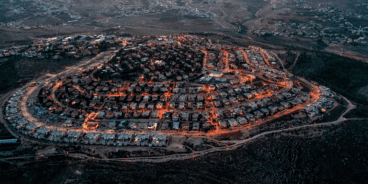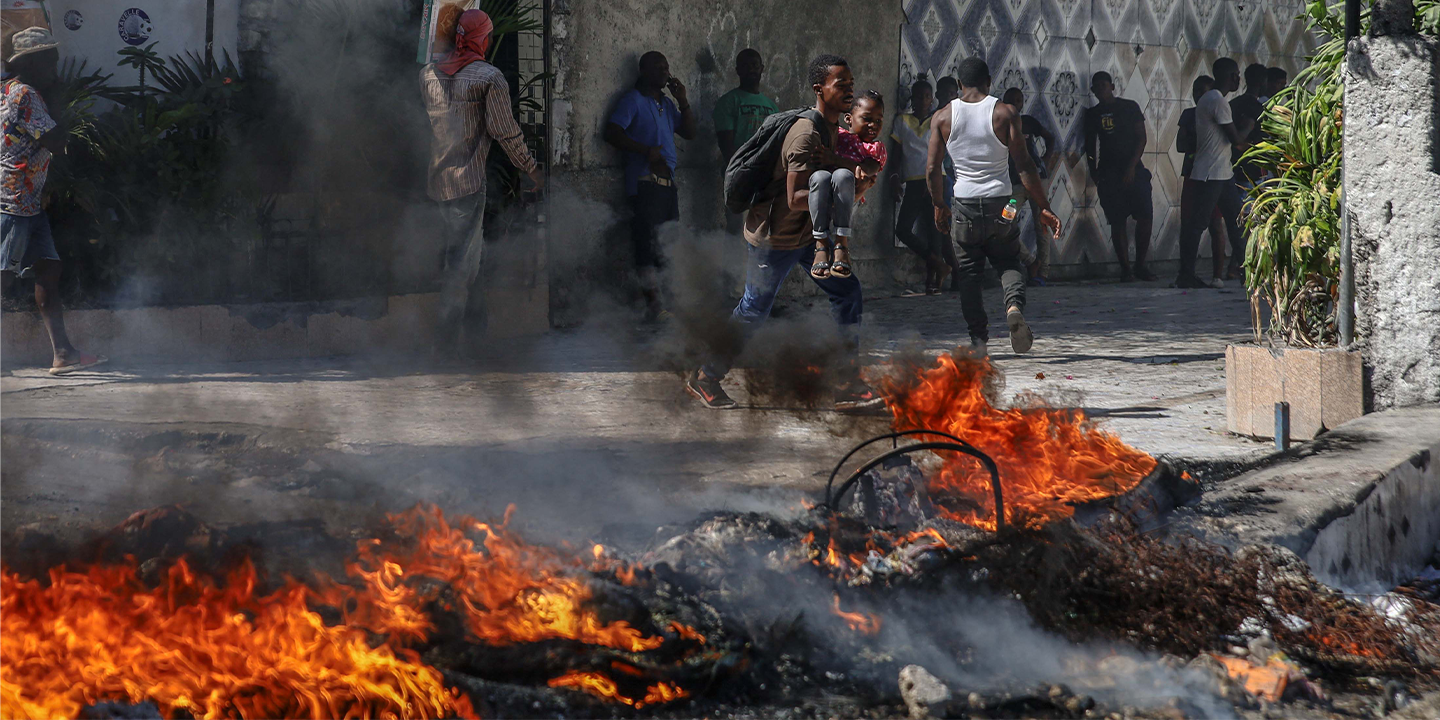

Atrocity Alert No. 387: Haiti, Syria and Ukraine
Atrocity Alert is a weekly publication by the Global Centre for the Responsibility to Protect highlighting situations where populations are at risk of, or are enduring, mass atrocity crimes.
POPULATIONS ACROSS PORT-AU-PRINCE FACING RELENTLESS TURMOIL AND VIOLENCE
Rampant unrest across Port-au-Prince has brought Haiti to near collapse as heavily armed gangs continue their violent assault across the capital. On 18 March gangs perpetrated attacks on the upscale neighborhoods of Laboule and Thomassin, looting homes, forcing residents to flee and leaving at least a dozen people killed in the surrounding areas. That same day, the country’s power company announced that several substations and a power plant “were destroyed and rendered completely dysfunctional,” which left areas of Port-au-Prince without power, including a hospital.
Since late February gangs have launched coordinated attacks targeting police stations, prisons, government institutions and civilian areas in Port-au-Prince. Local authorities said more than 130 civilians were killed between 27 February and 8 March. According to the International Organization for Migration, nearly 17,000 people fled Port-au-Prince from 8-14 March alone, thousands of whom took the risk of passing through gang-controlled routes to flee the violence. Many others remain stuck inside their homes without electricity and potable water. In the past two weeks hospitals have been set on fire, healthcare workers murdered and basic medical supplies stolen. Only one public hospital remains operational in Port-au-Prince.
Jimmy Chérizier, a former police officer who now leads a powerful gang coalition, claimed responsibility for the surge in attacks. During March Chérizier announced a pact between previously rival gangs, allegedly to consolidate power and deter the deployment of the Multinational Security Support Mission (MSS). Amid political upheaval not seen since the 2021 assassination of then-President Jovenel Moïse, Prime Minister Ariel Henry announced on 12 March that he would resign once a transitional council is created.
Meanwhile, the already dire humanitarian crisis continues to deteriorate following the closure capital’s main port on 7 March amidst the violence and insecurity. The port closure has stifled the flow of goods, including food, water and medical supplies and, according to the UN, over 300 humanitarian-owned containers are currently under the control of armed groups at the port. The UN Children’s Fund reported the looting of one of its containers, which held essential items for maternal, neonatal and child survival. On 16 March the police launched an operation to regain control of the port.
Jean-Martin Bauer, World Food Programme Country Director, warned of an impending famine, noting that that the levels of hunger in Port-au-Prince are typically seen in war zones, with nearly 1.4 million Haitians on the brink of starvation. Baur said, “Conflict and hunger in Haiti are moving hand-in-hand… I’m frightened about where we’re going.”
As Haitians continue to face an unprecedented security and humanitarian catastrophe, the international community must take steps to address the crisis in a holistic way. This should include urgently deploying the MSS with human rights due diligence and monitoring, increasing funding for the humanitarian response and bolstering efforts to curb the flow of illicit weapons and ammunition to gangs in Haiti.
SYRIANS ENDURE WORST VIOLENCE SINCE 2020 WHILE LIKELY WAR CRIMES CONTINUE
Populations in Syria are enduring violence at levels not seen in four years, according to a recently released report by the UN Human Rights Council-mandated Commission of Inquiry (CoI) on Syria. Amid the escalation in fighting, the CoI warned that parties to the conflict are perpetrating attacks on civilians and civilian objects across the country that may amount to war crimes.
The increase in violence came following an attack on the Homs Military Academy on 5 October 2023, when explosions in government-controlled Homs killed and injured dozens of civilians. This was the deadliest attack in government-held territory in years. Syrian government and Russian forces responded with heavy bombardments across opposition-held areas in Idlib, including through the use of internationally banned cluster munitions. Schools, markets, hospitals and displacement camps were struck and the CoI reported that hundreds of civilians were killed and injured and 120,000 displaced. Attacks and bombardments are ongoing in the northwest.
The CoI reported likely war crimes and additional international law violations across other areas of Syria. Aerial strikes by the Turkish military in the northeast hit powerplants that deprived nearly one million people of water and electricity for several weeks, which the CoI reported is in violation of International Humanitarian Law. Ongoing fighting between armed groups in the northeast have also resulted in civilian casualties, while the so-called Islamic State of Iraq and the Levant have increased their attacks in central Syria, targeting civilians in urban areas, all of which may amount to war crimes.
Additionally, the Syrian government continues to perpetrate enforced disappearance, torture and ill-treatment against detainees despite provisional measures issued by the International Court of Justice (ICJ) on 16 November that ordered the government to prevent torture and the destruction of evidence. According to the CoI, Syrian authorities continue to deliberately obstruct families’ efforts to learn the fate and whereabouts of their loved ones. Other armed groups, including Hayat Tahrir el Sham and the Syrian National Army, continue to perpetrate torture, ill-treatment and unlawful deprivation of liberty against populations.
In a press release on 11 March, the Chair of the CoI, Paulo Pinheiro, said, “The Syrian people cannot sustain any further intensification of this devastating, protracted war.” All parties to the conflict must immediately cease all indiscriminate and direct attacks on civilians and civilian objects. The Syrian government must urgently implement the ICJ’s provisional measures order. UN member states must ensure the newly-mandated Independent Institution on Missing Persons in Syria receives the sufficient resources to fully carry out its mandate.
CIVILIANS CONTINUE TO SUFFER ABUSES IN THE ONGOING CONFLICT IN UKRAINE
During the afternoon on Friday, 15 March, a series of Russian missiles struck civilian infrastructure in Ukraine’s southern port city of Odesa, killing at least 20 people and injuring at least 73 others in a so-called “double tap” attack. The initial strike hit several homes, which triggered the deployment of emergency responders to the area. Then a second missile struck the same spot, killing and injuring at least seven emergency workers who responded to the attack. The strike in Odesa was the deadliest attack in Ukraine in the last three weeks. The UN has also verified 31 civilian casualties, including 10 children, due to Russian strikes on two apartment buildings in the city of Kryvyi Rih in Dnipropetrovska Oblast on 12 March.
The UN Humanitarian Coordinator for Ukraine, Denise Brown, deplored the 15 March attack stating, “The loss of lives and injuries inflicted on civilians and those selflessly risking their lives to save them is utterly unacceptable. International humanitarian law requires the protection of civilian population, and launching an attack knowing that it would be disproportionate is a breach of this law.” The intentional targeting of civilians and civilian infrastructure, as well as attacks on humanitarian workers, may amount to war crimes and crimes against humanity under international law.
Friday’s attack in Odesa occurred the same day as the Russian presidential election began, which was characterized by an atmosphere of heightened tensions. According to residents in illegally Russian-occupied areas of Ukraine – areas in the Kherson, Donetsk, Luhansk and Zaporozhzhia regions – armed guards went door-to-door with ballot boxes to coerce civilians to vote. Yevhenia Hliebova, a local official in Kherson, described how armed soldiers accompanied election officials, stating, “He was carrying a weapon, so it was a threat, not verbal, but in fact it was a threat of violence… [An] election at gunpoint.”
Meanwhile, Ukraine has fired artillery and levied drone attacks on Russian cities, oil refineries and weapons depots. Vyacheslav Gladkov, the regional governor of Belgorod, which borders Ukraine, said three people, including a child, were injured in attacks on 19 March, while part of the region was left without power. The day before four members of the same family died in an attack on the village of Nikolskoe, including an elderly grandmother and a teenage boy, after a missile struck their house. According to Gladkov, at least 16 people have been killed and 98 wounded in attacks over the past week. The region plans to evacuate 9,000 children further east as Russian President Vladimir Putin announced his intention to create a “buffer zone” to help protect border regions from long-range Ukrainian strikes and cross-border raids by Ukraine-based Russian opponents of the war.
After three years of full-scale war, populations in Ukraine continue to live under the constant threat of bombardment. Amidst the protracted crisis, the international community must continue to maintain its support to populations in Ukraine, including by providing humanitarian assistance to alleviate the suffering of those affected by the war. Accountability mechanisms must be transparent and respect international standards to deliver the justice survivors and victims of atrocity crimes in Ukraine deserve.
Related Content


Atrocity Alert No. 403: Israel and the Occupied Palestinian Territory, Sudan and the UN Human Rights Council
